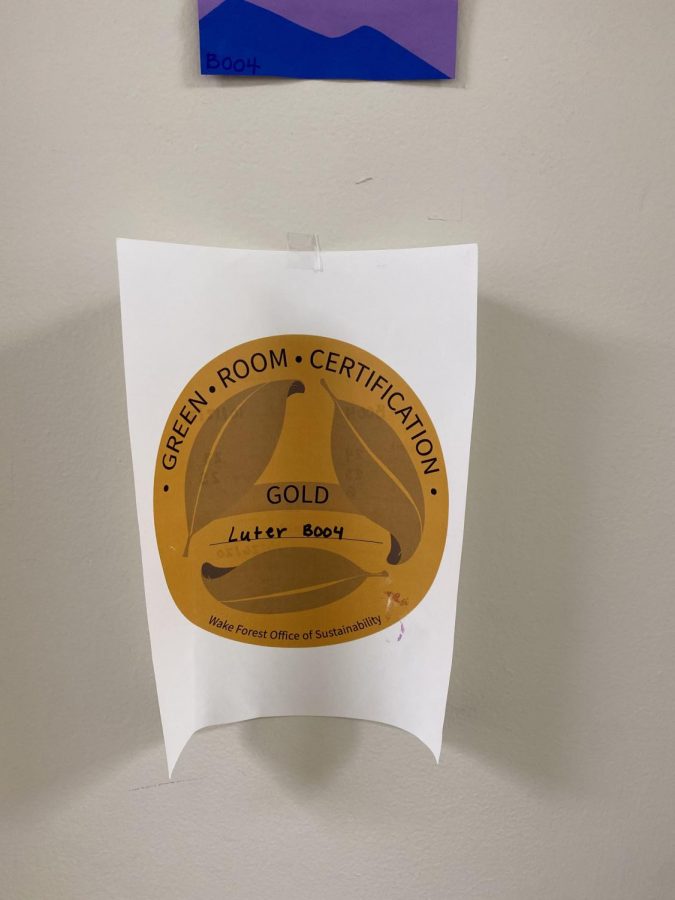Green Room Challenge inspires freshmen
The Green Room Challenge prompts students to consider the sustainability of their habits
Those who take the Green Room Challenge’s two surveys are awarded a score, and based on that score, receive a plaque on their door.
April 8, 2021
How often do you turn the lights off when you leave your room? Do you always recycle bottles and cans? Do you limit your use of plastics? Answer these questions in a survey, and you’ll learn what your score is for the Green Room Challenge.
“The purpose of the challenge is to call to mind and get people thinking about the actions they take every day and how they can make choices to be more sustainable,” First-Year Leadership Assistant for the Sustainability Leadership Group and sophomore Meredith Power said.
The Sustainability Leadership Group (SLG) is composed of 29 freshmen who serve as peer leaders and promote environmental awareness and sustainability within first-year residence halls through initiatives like the Green Room Challenge. The SLG, established in 2019, has organized this challenge for the past two years as a way to encourage freshmen to set sustainable habits during their first year away from home.
In the fall of 2020, 259 freshmen participated in the challenge by taking the survey.
The Green Room Challenge was one of the few activities the SLG was able to organize this year in spite of restrictions enforced on campus as a result of COVID-19. SLG members advertised the challenge differently depending on their residence hall.
SLG member Georgia Cowie was responsible for promoting the challenge in Luter Residence Hall.
“We went around to different halls and taped a Post-it Note or small piece of paper with the link to the survey, and maybe a piece of candy or two to each room,” Cowie said.
The Green Room Challenge is based around two surveys which are administered two weeks apart. Upon completion of the surveys, participants were awarded a certificate that announced a status; the possible categories were in-progress, bronze, silver, gold or platinum.
Because each individual’s rating was determined through self-reporting, it was difficult to gather objective data for measuring improvement.
“We use it as a promotional tool to be mindful of our habits, not necessarily track progress,” Cowie said. “The second survey did tell you how you improved, but it didn’t really show your journey.”
According to Power, placing certificates and prizes on students’ doors not only awards individuals for their sustainable practices but also serves as a method of community-based social marketing. This tool is used to reinforce positive behavioral norms and inspire change within the communities that it targets.
“In the Office of Sustainability we use a lot of different techniques, like psychological techniques and social science techniques to create behavior change,” Power said. “When you have a certain certification that’s seen by your peers, it holds you more accountable. If you have the medallion on your door that says that you’re gold or you are in progress, it puts more of a social pressure on you to take different actions.”
Although the results of the Green Room Challenge are widespread throughout South Campus, this initiative fell short of its goal to include every freshman.
Eva Merlino, a freshman and environmental & sustainability major, did not partake in the Green Room Challenge simply because she was not aware of the activity in her residence hall, Babcock.
“I did not have the opportunity to complete the survey,” Merlino said. “And I think people in my hall definitely would have done it if they had the chance.
Merlino believes the challenge should be available to all undergraduate students as a way to further encourage sustainable practices.
“I think a lot of the time college students go with trends, and if the community around them is doing certain things, they’re pretty susceptible to do them as well,” Merlino said. “The most difficult thing is to approach people who have no care about the environment, so maybe enforcing rules is the only way [to do so].”
The former Director of the Graduate Programs in Sustainability, Dr. Dan Fogel, believes that, although changes in one’s behavior can be difficult to promote, the university must educate students on sustainable practices through programs like the Green Room Challenge.
“Some people think about environmental issues as moral or economic issues and others as what is good for everyone,” Fogel said. “The appeals you make to students, or anyone in society, should respond to these worldviews. The university’s job is to teach good habits so that when students leave they think more often about how to contribute to environmental outcomes.”














